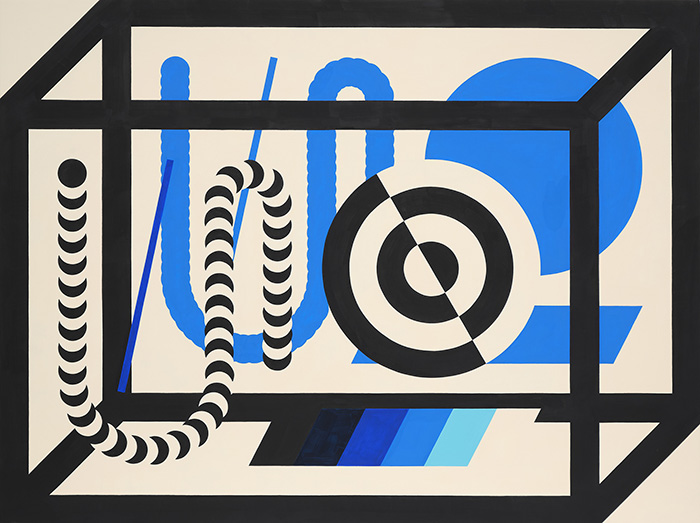
INFINITE GAMES
GROUP EXHIBITION
JUNE 24 – AUGUST 5, 2023
OCHI is pleased to present Infinite Games, an exhibition of new works by Gianna Commito, Hannah Knight Leighton, Sarah Hotchkiss, and Nora Shields. Infinite Games will be on view at OCHI, located at 3301 W Washington Blvd in Los Angeles, California from June 24 through August 5, 2023. An opening reception will take place on Saturday, June 24th from 4:00 to 7:00 PM PST.
Named for the latter of James P. Carse’s influential Finite and Infinite Games (1986), Infinite Games identifies four artists who utilize abstraction as an observational tool to mirror found systems of logic, develop new strategies for play, and privilege experiential interaction. A beloved scholar described by his peers as curious, generous, and undimmable, Carse died in 2020, living long enough into the pandemic to suggest that its temporary limitations were fertile ground for imagining new futures and could potentially spark an intellectual revolution[1]. Simple observations and gestures reflect spirituality, politics, and ethics throughout Finite and Infinite Games, which begins: “There are at least two kinds of games. One could be called finite, the other infinite. A finite game is played for the purpose of winning, an infinite game for the purpose of continuing the play.”
Sarah Hotchkiss makes geometric drawings and paintings that reference found graphics like board games, puzzles, mazes, test card patterns, and optical illusions. Drawn to imagery that may serve a utilitarian function, but inadvertently doubles as art, Hotchkiss’ gouache and acrylic paintings employ hard-edged graphic qualities and astute color combinations that often result in scintillating optical effects. Hotchkiss’ paintings don’t conceal their origins, but playfully build their own systems of self-contained logic that are pleasurable to untangle.
Hannah Knight Leighton makes large-scale abstract paintings using a tufting gun that focus on the tension between traditional craft techniques, painting history, the aesthetics of casual consumerism, and the influence of digital technologies on contemporary perception. Beginning with digital sketches made on an iPad, Leighton clone stamps, lassos, and layers multiple compositions, creating irreverent interruptions across the screen. Her compositions offer portals into previous configurations, zoetropic abstractions that mutate as they multiply, or brain-bending multi-dimensional puzzle parts that coagulate into impossible architectures.
Gianna Commito makes abstract paintings in relation to unpredictable, organic, social, and perceptual aspects of built environments, drawing equal inspiration from histories and strategies of craft and design. Observing patterns and repetitions in her daily routines, Commito reimagines physical constants as formal factors in her paintings—the grid, the stripe, the frame—which provide a stable underpinning for busy and spontaneous interactions between layers of visual information. Little is predetermined as Commito allows an image to unfold intuitively, prioritizing the pleasure of wrestling with colors, patterns, and techniques. Commito’s quirky combination of materials is the result of years of experimentation. Wood panels are primed with marble dust and hide glue, creating a durable surface able to withstand masking, sanding, and many layers, which results in a physicality reminiscent of ceramic tile or frescoed wall. Commito’s paintings present an underlying anxiety or slipperiness as layers unite in alliance or balance in juxtaposition—a physical tension that affectively mirrors the artist’s content.
Though fundamentally sculptural, the work of Nora Shields is frequently in conversation with the history of painting, expanding beyond the pedestal and the frame to engage the architectural contexts and challenge the psychological limits of perception. Working in stone, metals, and sometimes wood and fabric, Shields’ shapes echo the lineage of decorative symbols often associated with textiles and ceremonial accoutrement such as fans, sashes, and other expressions of heraldry. Using a color palette drawn from natural and artificial worlds, which she approximates using industrial-grade automotive paint, her lyrical works make powerful statements about the role of ornamentation in the constitution of form and the power of material choice to signify subjectivity, gender expression, spirituality, or authority.
Infinite Games and Finite and Infinite Games both end with the same sentiment: “Infinite players are not serious actors in any story, but the joyful poets of a story that continues to originate what they cannot finish. There is but one infinite game.”
[1] “Dr. James P. Carse,” The Recorder, Oct. 10, 2020

